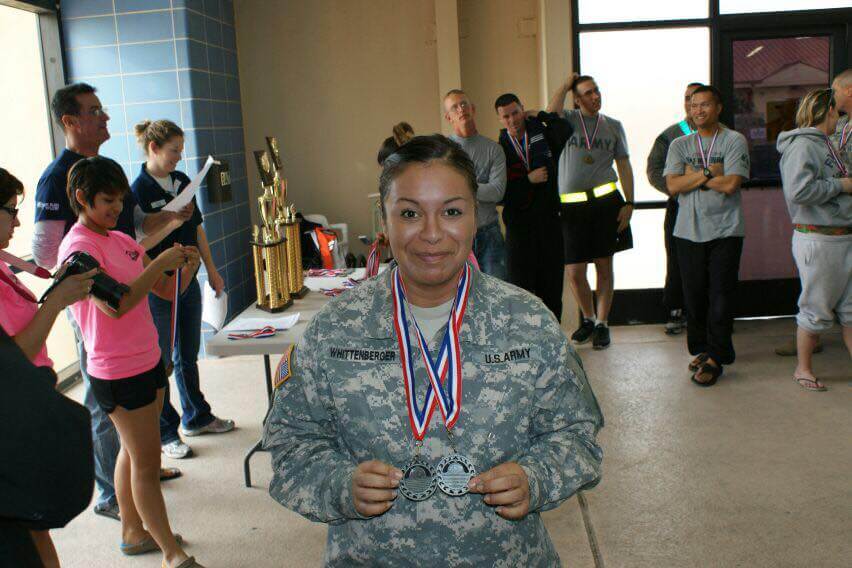Army veteran, Maj. Annette Whittenberger, who suffers from PTSD, depression and anxiety helps fellow veterans with post-traumatic stress disorder by reminding them they are not alone.
Whittenberger is open and honest about her daily struggles with mental health, a topic she writes about in her blog, A Wild Ride Called Life. Blogging became therapeutic for Whittenberger, who admits that she found solace in the act of writing as it “helped me say things that I wasn’t ready to say out loud.”
A career in the Army
As a teenager, Whittenberger had no intention of joining the military, which she says wasn’t even on her radar, until she found out that her grandfather — whom she’d never met — had served in the Peruvian air force. Something in her clicked and she began looking into joining the military after all.
“In 1994, I got as far as having a military recruiter come to my house and almost signing the papers,” she said. “At the time, I was not ready and got scared. I felt like I needed to go to college first.”
After graduating from Arizona State University with a bachelor’s in psychology, Whittenberger commissioned as a second lieutenant into the Chemical Corps. Her first duty station was in Germany, where she was also joined by her husband, whom she had met in college and was also in the military. Their two children were born in Germany in 2000 and 2003, but life as a dual military family soon became hard to juggle.
“Being away from home at the age of 23 and having children overseas was a stressful and sad time for me,” Whittenberger admitted, “but with support of my Army family, I was able to raise those babies while my husband often left for training and small deployments.”
A tragic deployment to Afghanistan
In 2008, after her family made a Permanent Change of Station to Fort Hood, Texas, Whittenberger deployed to Afghanistan. While she had deployed once before, this deployment quickly turned tragic for her.
“The unit I was assigned to was involved in missions that ended up with losing many soldiers,” Whittenberger recalled.
Transitioning back to life at home was also rather difficult for her. “When I came back home, reintegrating back to a different life was one of the hardest things I’ve ever had to do,” she said. “No, some may not be able to pick up where they left off. Getting back to the normalcy of things is not as easy as some may think.”
Unfortunately, Whittenberger also lost fellow soliders to suicide, as many of them were not able to handle life stressors once they were back from the war. This took a toll on Whittenberger, who shared that she “became severely depressed. I did not know how to cope with life. I really felt like a failure.”
In 2016, she was forced to retire from the Army after serving 17 years, since “the Army was downsizing, and I was not promotable for the next rank.”
This sudden change caused her to fall into an even deeper depression.
Female veterans are on the rise
In 2015, females represented 9.4% of all veterans. It’s a percentage that, according to the U.S. Department of Veterans Affairs predictions, is destined to increase to 16% by 2040.
Dr. Jerid Fisher, forensic neuropsychologist, explained that, “It is estimated that 20% of female vets serving in Iraq and Afghanistan subsequently developed PTSD because of four major factors: combat, sexual assault, feelings of isolation and worries about family members back home.”
Although Fisher encourages veterans to “seek diagnostic and therapeutic assistance for their PTSD symptoms because they are most amenable to improvement when identified early and treated aggressively,” Whittenberger admits that asking for help proved to be one of the hardest challenges for her and many other veterans. In fact, she admitted she has “seen so many lives taken because they don’t know how to ask for help. They are too embarrassed to ask for help for fear of being judged.”
Reaching out to veterans
Whittenberger credits her two children and her Maltese dog, Lulu, for giving her the strength to face depression, anxiety and PTSD. Through her blog, she is on a mission to “erase the stigma of living with PTSD, anxiety and depression, and asking for help.”
Above everything else, Whittenberger wants fellow veterans to know that “they are not alone.” Based on the countless messages of support and appreciation she receives, she is accomplishing her goal. Jennifer Hogan met Whittenberger many years ago while both were serving in the Army as second lieutenants. The two of them became close friends but lost touch after training. However, thanks to social media, they reconnected.
Hogan follows Whittenberger’s blog and states that, “Annette has been such an inspiration to me! She gives me courage to keep fighting through my struggles when I see her be courageous regardless of all of her own struggles. I love that she has initiated and sparked the mental health conversation.” She went on to add, “A lot of people hurt in silence and shame, and I am one of them. She shows me and encourages me to look at things differently. I appreciate her for that. I appreciate her! She’s helped me to keep fighting and to keep smiling!”
Recently, Whittenberger has taken her mission to help veterans beyond the internet and in August 2019 spoke at the BEE Daring Foundation, a mental health summit, whose founder asked for her personally.










